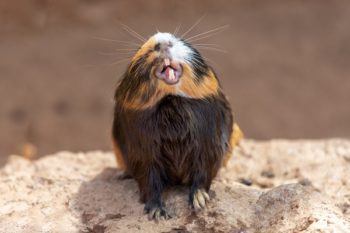
What do dogs, cats, rabbits, chinchillas, guinea pigs, and degus have in common? Teeth! And because they get used daily, keeping your pet’s teeth healthy is important to their overall health and quality of life. February is Pet Dental Health Month so it’s a great time to review the basics for our four-legged companions.
70-80% of cats and dogs have some form of dental disease, yet there are so many convenient ways to prevent most of these cases. The best way to combat the stats is to start a dental hygiene regime for your cat or dog BEFORE any problems come up. The gold standard is daily brushing with toothpaste made for pets. Understandably, this can be difficult to keep up daily, especially in multi-pet homes.
If you’re unable to brush their pearly whites every day or you have a cat or dog that is resistant to brushing despite appropriate training, there are plenty of products that can prevent plaque and tartar. In fact, there are so many different diets, water additives, chews, and treats that are marketed as oral health products, it can be overwhelming! The Veterinary Oral Health Council has developed its own “Seal of Approval” and provides lists of approved retail and veterinary exclusive products on its website. Be sure to consult your veterinarian to determine which ones would benefit your individual pet most.
Rabbits, guinea pigs, chinchillas, and degus have teeth that grow continuously throughout life, just like our fingernails. If their teeth don’t get enough of the right kind of wear and tear, they can become overgrown and result in much more serious problems such as malocclusion (teeth growing the wrong way), painful facial abscesses, infections, and emaciation (due to pain or inability to eat). The leading cause of acquired dental disease in these herbivorous companions is improper diet. The good news is that you can keep their teeth straight (pun intended) by doing something you already do every day – feeding!
Rabbits, guinea pigs, and chinchillas depend on high-fiber grass hay to wear their teeth down and support a healthy gastrointestinal tract. There are several types of commercially available hays so you should be able to find a couple your pet especially likes (avoid alfalfa hay for adults unless otherwise recommended by your veterinarian, as it is high in protein and calcium). Hay should be available 24 hours a day. Fresh leafy green vegetables and species-specific pellets are also great, but they should complement a predominantly hay diet.
One last thing: just like people, your pet’s teeth will inevitably change over time, so it’s important to have them checked by your veterinarian once per year. Your veterinarian can take a deeper look into your pet’s mouth and identify changes or problems that could otherwise go unnoticed. More frequent check-ups may be recommended if your pet has a history of dental problems.
February may be dental month, but dental health for pets truly is a year-round commitment.
